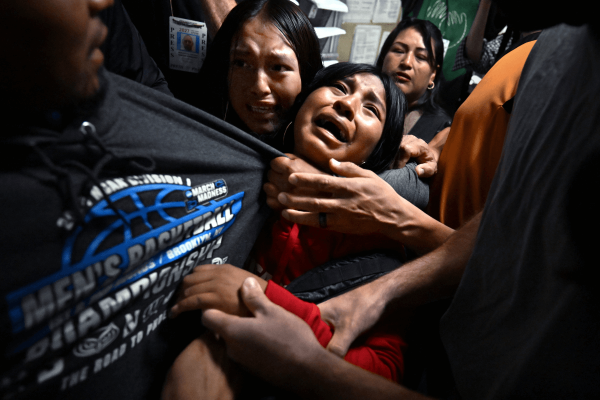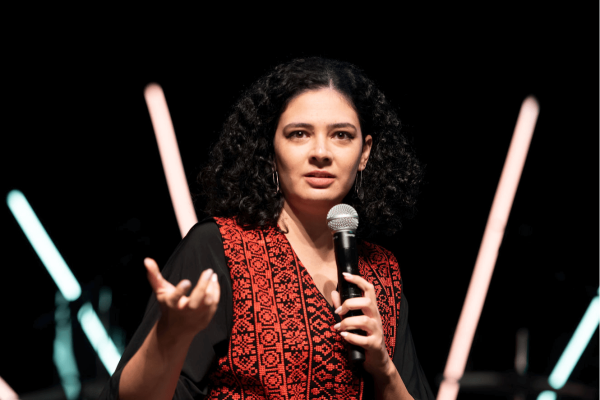Oscar season hasn’t even started, and 2025 is already shaping up to be a strong year at the movies. We’ve seen small-budget standouts, from the thought-provoking body horror of Together to the empathetic dramedy of Sorry, Baby. Even the superhero blockbusters—Superman, Fantastic Four—had more to say about justice and community than I’ve come to expect from spandex cinema. And then there was Sinners, which was perfect.
In August, at least 20 people were killed in an Israeli attack on Nasser Hospital in southern Gaza. According to MSNBC, Israel struck the hospital at least four times, killing journalists, health workers, and emergency response personnel, many of whom were responding to the initial round of bombings.
“On Sunday, Erika Kirk forgave the man who shot her husband,” Jimmy Kimmel told his live studio audience on Tuesday night, his first show back after a six-day suspension following his musings on Charlie Kirk’s assassination. “She forgave him.”
“That is an example we should follow,” Kimmel continued, his voice cracking with emotion. “If you believe in the teachings of Jesus, as I do, there it was. That’s it. A selfless act of grace, forgiveness from a grieving widow that touched me deeply. And if there’s anything we can take from this tragedy, I hope it’s that.”
When a Texas Republican congressional candidate used a flamethrower to set a Quran ablaze as part of a political ad in August, I wasn’t shocked by the act itself.
Unfortunately, burning the Quran as a political act has a long history. What made my heart sink was hearing the candidate claim the fire was “powered by Jesus Christ.”
When Robert Redford was 18 years old, his mother died—suddenly and young—following complications from delivering twin girls who did not live long. This harrowing loss left young Redford disillusioned with God. “I’d had religion pushed on me since I was a kid,” he would tell Michael Feeney Callan, his biographer. “But after Mom died, I felt betrayed by God.”
“I keep hoping that gets easier,” one character in The Long Walk says, shortly after witnessing the gruesome execution of a companion. Still visibly shaken, Cooper Hoffman’s character Ray Garraty replies: “That’s what I’m afraid of.”
A 2025 film adapted from the 1979 novel by Stephen King, The Long Walk depicts a dystopian near future where young boys from all over the United States voluntarily compete in a contest to walk at 3 mph continuously across hundreds of miles—with those who repeatedly fall below the pace being shot dead until there is one winner of glory and riches.
Last week the Trump administration announced Operation Midway Blitz, which extends the surge of ICE agents sent to Los Angeles and Washington, D.C., into Chicago; additional ICE surges are happening in Boston and are planned for Memphis. This increased ICE activity follows an alarming Supreme Court shadow docket ruling that permits the administration to stop people on the basis of personal appearance, language, or type of employment. In other words, racial profiling is now explicitly permissible for immigration officials.
If your life is proceeding basically as normal—school drop-offs, daily commutes, medical appointments, visits with grandchildren, stressful jobs, or the daily rhythms of life—it can be hard to remember the fear that many of our immigrant neighbors now feel. Despite my job leading a social justice organization, I’ll confess that I’m not immune from the temptation myself.
Romans 13:1, much to my chagrin, reads, “Let everyone be subject to the governing authorities, for there is no authority except that which God has established. The authorities that exist have been established by God.”
I’ve been on the receiving end of a pointed quotation of this passage more than once; usually when I’ve questioned the governance of a particular leader or advocated for someone who has broken a law. But all too often, these words seem to vanish from my critics’ memories when their preferred leader is out of power. The Bible is decidedly nuanced in its opinions on this matter.
Last weekend, I visited my home state of Illinois to attend the Church at the Crossroads conference, which was held at Parkview Community Church in Glen Ellyn. Conference organizers estimated that 580 attended in person and 300 more joined virtually. The conference was convened to encourage American evangelicals to listen to Palestinian Christians and to confront and correct those who use scripture to “justify war, occupation, or silence” in the face of the escalating violence in Israel and Palestine.
Practically speaking, though, what was the point of this shindig?
I've grown tired of this question: “How do we get young people to come to church?”
Yes, I know that 49% of Americans born in the 1940s or earlier attend religious services at least once a month. And yes, I know that when it comes to my ilk, people born in the 1990s or 2000s, that percentage cuts in half. Those numbers don’t scare me.







